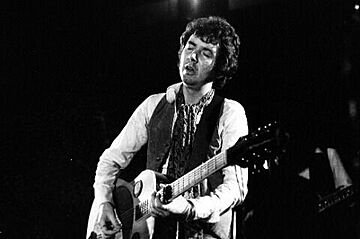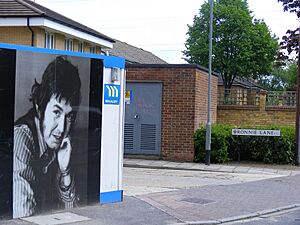Ronnie Lane facts for kids
Quick facts for kids
Ronnie Lane
|
|
|---|---|

Lane performing with Slim Chance, 1975
|
|
| Background information | |
| Birth name | Ronald Frederick Lane |
| Also known as |
|
| Born | 1 April 1946 Plaistow, London, England |
| Died | 4 June 1997 (aged 51) Trinidad, Colorado, US |
| Genres | |
| Occupation(s) |
|
| Instruments |
|
| Years active | 1964–1992 |
| Labels | |
| Associated acts |
|
Ronald Frederick Lane (born April 1, 1946 – died June 4, 1997) was an English musician and songwriter. He was a talented bassist and helped start two famous rock bands: Small Faces and Faces.
Ronnie Lane formed Small Faces in 1965 after meeting Steve Marriott. Together, they wrote many hit songs. These included "All or Nothing", "Itchycoo Park", and "Lazy Sunday".
After Steve Marriott left Small Faces in 1968, the remaining members, Ronnie Lane, Ian McLagan, and Kenny Jones, teamed up with Rod Stewart and Ronnie Wood. They formed a new band called Faces. This band also became very successful.
Ronnie Lane left Faces in 1973. He then worked with other musicians, led his own bands, and started a solo music career. In 1977, he was diagnosed with a health condition called multiple sclerosis. Friends, former bandmates, and fans helped support him. He lived with his condition for 21 years and passed away in June 1997 at age 51.
For his amazing work in both Small Faces and Faces, Ronnie Lane was honored in 2012. He was added to the Rock and Roll Hall of Fame after his death.
He had two children and two stepchildren.
Contents
Growing Up and Starting Music
Ronnie Lane was born in Plaistow, a working-class area in East London. His parents were Elsie and Stanley Lane. His father, Stanley, worked as a lorry driver. Ronnie often said his father was a "saint." His dad worked long hours and then cared for his wife and two sons, who all developed multiple sclerosis (MS) at different times. Doctors told Ronnie as a child that this condition was not always passed down. However, he later learned he had inherited it.
After finishing school at 16, Ronnie met Kenney Jones at a local pub. They started a band called The Outcasts. Ronnie first played lead guitar but soon switched to bass guitar.
When looking for a bass guitar, Ronnie visited a music store. There, he met an employee named Steve Marriott. Ronnie bought his bass and went to Steve's house after work. Steve showed him his collection of Motown and Stax music. Ronnie and Steve decided to form a band. They asked their friends Jimmy Winston and Kenney Jones to join. Jimmy switched from guitar to organ, and Steve became the lead singer.
Ronnie Lane's Music Career
The Small Faces Band
The band Small Faces included Ronnie Lane on bass, Steve Marriott on guitar and lead vocals, Kenney Jones on drums, and Jimmy Winston on keyboards. They were called "Small" because each member was under 5 feet 6 inches tall.
The band started performing in 1965. Ian McLagan joined in November 1965, replacing Jimmy Winston. Small Faces had many hit songs. Ronnie Lane and Steve Marriott wrote most of these hits, like "Itchycoo Park" and "All or Nothing".
Ronnie also helped write almost all the songs on their 1968 concept album, Ogdens' Nut Gone Flake. This album was very popular and stayed at number one on the UK Albums Chart for six weeks. When Steve Marriott left the group in 1969, the band broke up.
Forming the Faces Band
In 1969, Ronnie Lane formed a new band called Faces. He was joined by Ian McLagan, Kenney Jones, Ronnie Wood, and Rod Stewart. Ronnie shared songwriting duties with Rod Stewart, Ronnie Wood, and Ian McLagan.
By 1972, Rod Stewart was focusing more on his solo career. So, Ronnie Lane took a bigger role in making their fourth and final album, Ooh La La. Ronnie was not happy with the album's reviews and Rod Stewart's lack of commitment. He decided to leave the band in 1973. His last performance with Faces was on June 4 at the Sundown Theatre in Edmonton, London.
Tetsu Yamauchi replaced Ronnie, but the band did not make any more studio albums after Ronnie left. Faces broke up in 1975. Ian McLagan later said that Ronnie regretted leaving Faces. "Debris" was one of Ronnie's well-known songs where he sang lead vocals.
Life in Wales and Later Career
In 1973, Ronnie Lane moved to Fishpool Farm in Hyssington, Wales. This village was just across the border from England. In the late 1970s, as he started to feel the effects of his health condition, he moved back to London.
After leaving Faces, Ronnie Lane started his own band called Slim Chance. They released hit singles like "How Come" (which reached No. 11 in the UK) and "The Poacher" (No. 36 in the UK). Their album Anymore for Anymore mixed British rock, folk, and country music.
The first members of Slim Chance included Scottish singer-songwriters Benny Gallagher and Graham Lyle. They sang harmonies and played many instruments. They left in May 1974 to continue as a duo.
After some early success, Ronnie toured the UK with "The Passing Show." This was like a circus carnival with tents and performers. Vivian Stanshall from the Bonzo Dog Doo Dah Band even served as a ringmaster for a short time.
Ronnie then signed with Island Records and released the albums Ronnie Lane's Slim Chance and One for the Road. In late 1976, he briefly rejoined Small Faces for a reunion, but he left after two rehearsals.
Ronnie had signed a contract with Atlantic Records as part of Small Faces. He was told he still owed the company an album. So, he made the album Rough Mix with Pete Townshend. This album was released in 1977 and was praised by many critics.
While recording Rough Mix, Ronnie Lane was diagnosed with multiple sclerosis. Despite this, he continued to tour, write, and record music. He even worked with Eric Clapton. In 1979, he released another album called See Me. This album included several songs written by Ronnie and Eric Clapton.
In 1983, Ronnie's girlfriend, Boo Oldfield, contacted Glyn Johns. She wanted to organize a concert to help raise money for research into multiple sclerosis. They decided to book the Royal Albert Hall for two nights. The ARMS Charity Concerts featured many famous musicians. These included Eric Clapton, Jimmy Page, Jeff Beck, Bill Wyman, Charlie Watts, Ronnie Wood, Kenney Jones, Andy Fairweather Low, Steve Winwood, and others. They even toured the US with Joe Cocker and Paul Rodgers.
Later Years and Passing
In 1984, Ronnie Lane moved to Texas in the United States. He lived first in Houston and then in Austin. The warmer climate was better for his health. He continued to play, write, and record music there. He formed an American version of Slim Chance, which was a group of musicians who played together when they could. Alejandro Escovedo was a regular member for a long time.
Ronnie Lane was very respected in the Austin music scene for almost ten years. He toured Japan, but his health continued to get worse. His last performance was in 1992 with Ronnie Wood and also with Ian McLagan.
In 1994, Ronnie and his wife Susan moved to Trinidad, Colorado. Jimmy Page, Rod Stewart, and Ronnie Wood helped pay for his medical care. This was because he was not receiving many royalties from his work with Small Faces.
Ronnie Lane passed away from pneumonia on June 4, 1997. This happened during the final stages of his multiple sclerosis. He was buried in the Masonic Cemetery in Trinidad, Colorado. An album of live BBC recordings, made to raise money for his care, was released after his death.
Tributes to Ronnie Lane

Many artists have honored Ronnie Lane through their music. The band Ride recorded "A Trip Down Ronnie Lane" in 1996. The song "Travellers Tune" by Ocean Colour Scene was inspired by and written for Ronnie Lane in 1997. He was a big influence on their group.
In 2000, Paul Weller recorded "He's the Keeper," a song dedicated to Ronnie's memory. An album of live and studio recordings from Ronnie's time in Austin was released as Live in Austin.
In 2001, a street in Manor Park was named "Ronnie Lane" after him. In January 2006, BBC Four showed a detailed documentary about Ronnie Lane called The Passing Show. This film had been in the works since 2000 and included old concert footage of Faces and Slim Chance. In October 2006, the documentary was also shown on BBC Two.
In 2012, Ian McLagan, his former bandmate from Small Faces, recorded an album called Spiritual Boy: In Appreciation of Ronnie Lane. This album featured his interpretations of some of Ronnie's best-known songs. Ian McLagan passed away in 2014.
After Ronnie's death, his longtime friend and collaborator Charlie Hart put together a six-CD set of Ronnie's music. This set included many songs that had never been released before.
Ronnie Lane's Music Albums
Solo Albums
Studio Albums
- Anymore for Anymore with Slim Chance (1974) UK No. 48
- Ronnie Lane's Slim Chance with Slim Chance (1975)
- One for the Road with Slim Chance (1976)
- Mahoney's Last Stand with Ronnie Wood (1976) Atlantic
- Rough Mix with Pete Townshend (1977) US No. 45 UK#44
- See Me (1979)
- The Legendary Majik Mijits with Steve Marriott (2000)
Live Albums
- You Never Can Tell (The BBC Sessions) (1997)
- Live in Austin (2000)
- Rocket 69 (Live on German TV) (2001)
- Ronnie Lane Memorial Concert (remastered edition) (2021)
Compilation Albums
- Kuschty Rye (The Singles 1973–1980) (1997)
- Tin and Tambourine (compilation) (1999)
- April Fool (album) (1999)
- How Come (2001)
- Ain't No One Like (2003)
- Just for a Moment (2006)
- Ooh La La: An Island Harvest (2014)
- Just for a Moment: Music 1973–1997 (6CD box set) (2019)
Other Music Appearances
Single
- "How Come?"/"Done This One Before"
Various Artist Albums
- Happy Birthday (1970)
- I Am (1972)
- With Love (1976)
Guest Appearances
- Never a Dull Moment by Rod Stewart – Ronnie played bass on two songs (1972)
- Victory Gardens by John & Mary – Ronnie sang on one song (1991)
Albums with Small Faces
Studio Albums
- Small Faces (1966)
- Small Faces (1967)
- Ogdens' Nut Gone Flake (1968)
Albums with Faces
Studio Albums
- First Step (1970)
- Long Player (1971)
- A Nod Is as Good as a Wink... to a Blind Horse (1971)
- Ooh La La (1973)
 | Charles R. Drew |
 | Benjamin Banneker |
 | Jane C. Wright |
 | Roger Arliner Young |

